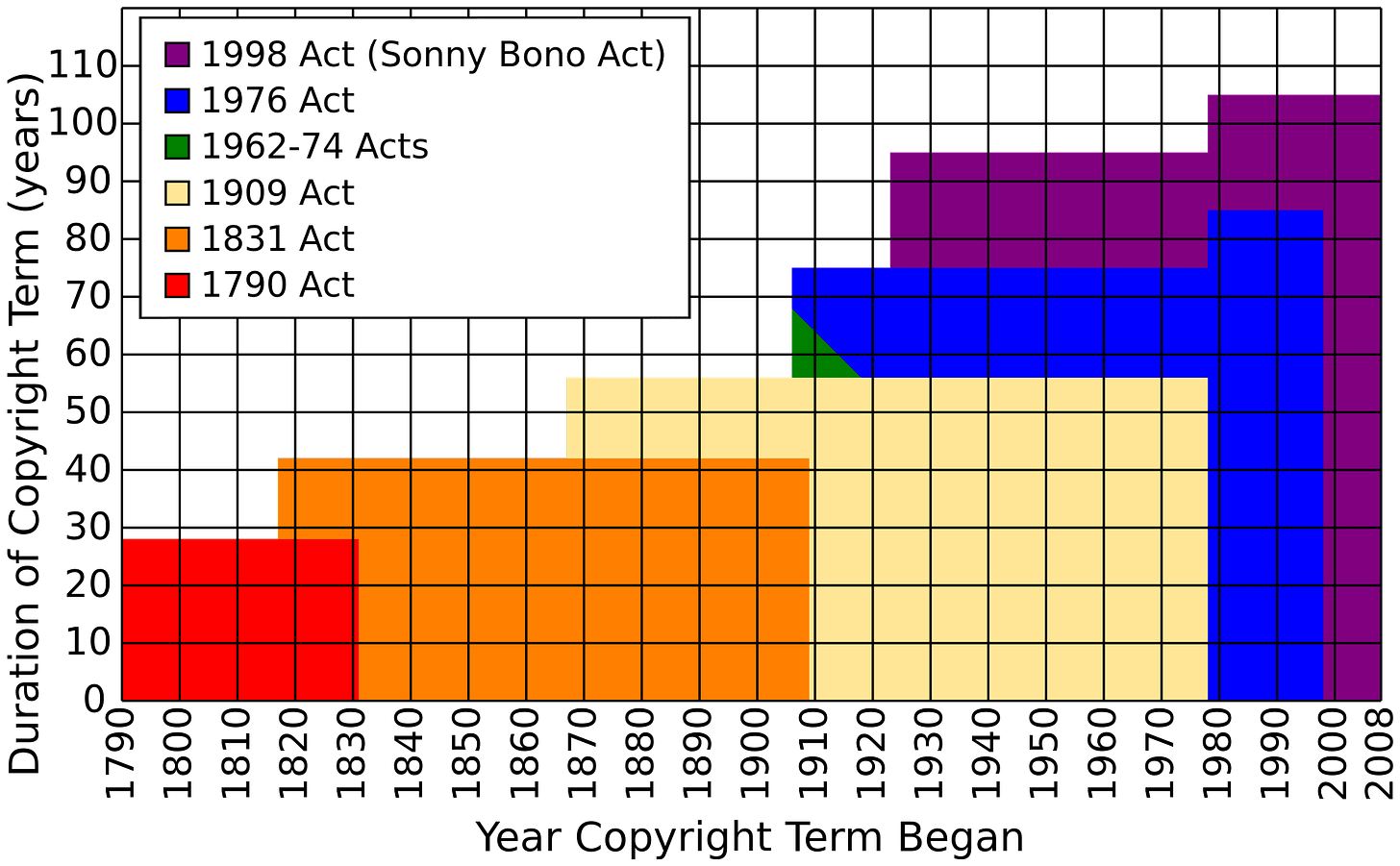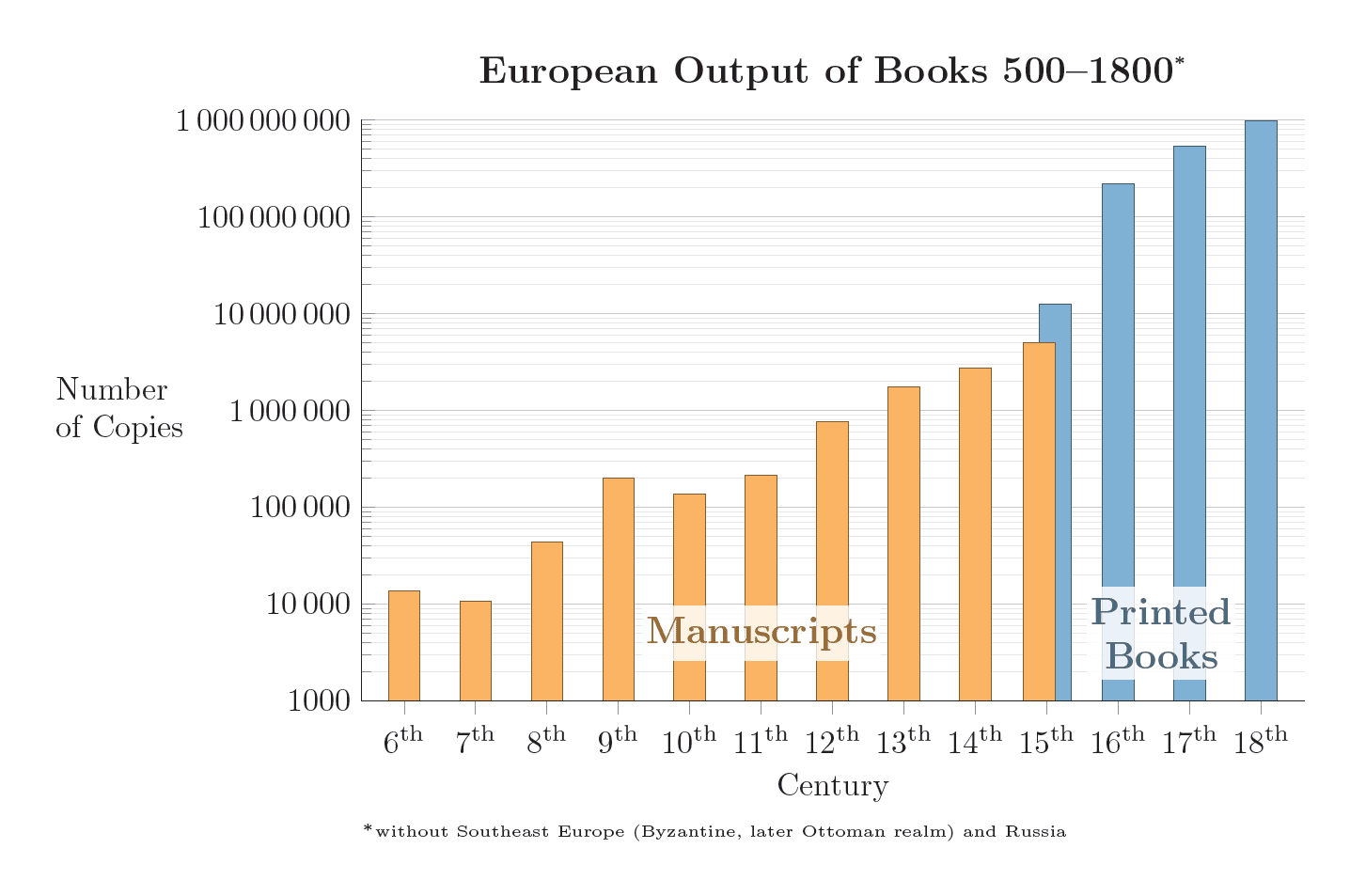Information goods have private costs and public benefits. Pharmaceutical research requires upfront investment from one firm, but once a certain compound is known to be effective it’s cheap for any company to produce. Writing a novel or filming a movie takes hundreds of hours of work from an author, but once the first copy is stored digitally it doesn’t cost anything to make a million more.
This is information’s greatest advantage and its central challenge. An idea, produced once, can spread and benefit millions without much investment in its reproduction or maintenance. Precisely this easy spread, though, means that the progenitor of an idea has little advantage over copiers. Copies carry almost all the benefits of information and almost none of the costs, so the original investment in creating the information is difficult to recoup.
Copyright attempts to correct the resulting underproduction of information by increasing the cost of copies for everyone except the original creator. This taxes information’s greatest advantage to subsidize its central challenge.
Since the invention of the printing press, the cost of producing and distributing almost all cultural artefacts has fallen rapidly. It is several thousand times cheaper to film a video, record a song, or write a paper and send it to a million people today than it was 50 years ago. Over this same period since the printing press, copyright was invented and repeatedly extended in breadth and length from 14 year bans on reprinting books to `life + 70` year monopolies over all things that look like Mickey Mouse or sound like Marvin Gaye.
Is the slow forward march of copyright terms the optimal response to the massive changes in information technology we’ve seen over the past several centuries?
Copyright before and after the printing press
How would optimal copyright law respond to the invention of the printing press?
The press affects copyright through three channels: Fixed costs of information, marginal costs of spreading information, and the substitutability of author-copies and knockoffs
The upfront fixed cost is easiest to understand. As printed books filled libraries and bookshops it was cheaper to do the background research required to write a new book. Decreasing the required upfront investment unambiguously decreases the optimal strength of copyright, all else equal. This upfront investment is what copyright is made to reimburse so if it decreases, copyright shouldn’t reimburse as much.
In the early years of the press, before printed books had filled all the libraries, the printing press mainly changed the marginal cost of spreading information. The upfront research and drafting that went into a book was unchanged; notes and first drafts were still handwritten. But the marginal cost of producing an extra copy once the draft was done fell by a few orders of magnitude.
This marginal cost decrease shifts the supply curve for books outwards, lowering prices and raising the quantity demanded. This higher quantity of books lets original authors compete more closely with copying competitors because the upfront fixed costs of research can be spread out over more books, decreasing the price difference between original and knockoff copies.
For example, imagine a market for books where author-published copies and knockoffs are imperfect substitutes, so they split the market. Under the pre-press production function and demand, only 100 books are produced. Say 10 come from the author and the other 90 come from copiers. If the author wants to recover their upfront investment, they have to price their books higher than the marginal cost of production by one tenth of their fixed cost. Depending on the elasticity of demand for author-published copies, this price hike might not leave them with any customers.
After the press, books are far cheaper to produce so the equilibrium quantity rises to 10,000. If the market shares of author-published copies and knockoffs stay the same, the author will sell 1,000 copies. Recovering their investment now only requires adding one thousandth of their fixed cost to the price of each book, a much more competitive price compared to the copied version. With smaller price differences, the little advantages that author versions have, e.g authenticity, warm-glow from contributing to public goods, or first-mover advantage, can more easily justify the author’s higher prices.
So decreases in the fixed and marginal costs of producing information seem to lower the optimal strength of copyright: The upfront investment is cheaper and authors don't need as much help competing with copiers when the market size is big.
But the printing press didn't just change costs, it also made author copies and knockoffs better substitutes. Knockoffs could be made faster so the first mover advantage of authors wasn’t as valuable and the printing press decreased transcription errors so copies were more reliable. When two goods become closer substitutes, changes in the price of one have larger effects on the quantity demanded of the other. In this case, both goods are decreasing in price at the same time and the net effect depends on the relative size of price changes and the elasticities of demand for author originals vs knockoffs.
Empirically, this seemed to balance out in favor of authors and massively increased their production of books. Despite the initial lack of copyright protection (or perhaps because of it), the printing press made it easier than ever to make a living writing and selling books without the subsidy of an appointment at a university or monastery.
Copyright before and after the internet
Most of the major information technology innovations after the printing press follow the same pattern of massively decreasing the marginal and fixed costs required to produce information but also making author published originals and copies closer substitutes.
This pattern reaches its zenith in text on the internet. It’s never been cheaper to research, write, and publish something that millions of people can read. But it’s also never been cheaper to copy text with perfect fidelity and post it somewhere else. So should text on the internet have longer or shorter copyright than text in books in the 16th century?
I'm honestly not sure, but I suspect modern copyright is far too long for two reasons.
1.) Empirically, the of exploding rates of content production we saw with the printing press has held with all following information technologies as well, even in areas with weak copyright. It seems that lots of people (including me) are willing to put hours of effort into content that they post on the internet for free. Billions of hours of high effort and quality content are available for free on Youtube. The generosity and patronage of a few thousand true fans is often enough to subsidize the fixed costs of creation for the rest of us.
2.) Our current copyright regime is based on concentrated-benefits-diffuse-costs attacks from special interests rather than anything like this optimal tradeoff so it seems unlikely that we’ve got it right, and the bias is towards overly strong copyright.
More of our economy is information goods than ever and this is only accelerating. Generative AI will continue this centuries long trend. The upfront cost of creating a beautiful video or piece of music will fall further along with the marginal cost of spreading it, while the substitutability of copies will increase. Better understanding the effects of this type of technological change is important and growing more so by the day.
See also, Gwern's useful comments on this post



Executive summary: Technological innovations that decrease the fixed and marginal costs of producing information tend to decrease optimal copyright strength, but also increase substitutability between original and copied works, with ambiguous net effects. Modern internet text likely warrants shorter copyright than physical books.
Key points:
This comment was auto-generated by the EA Forum Team. Feel free to point out issues with this summary by replying to the comment, and contact us if you have feedback.